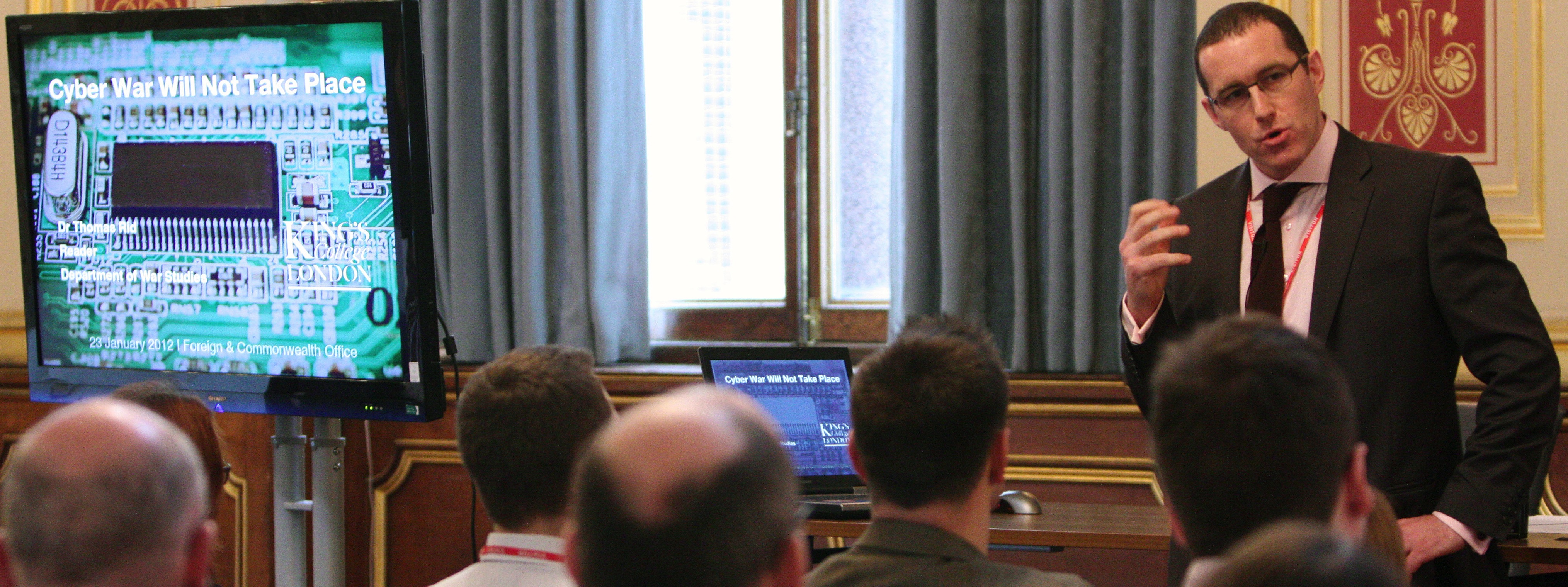Rid, T (2012) "Cyber War Will Not Take Place" Journal of Strategic Studies, vol 35, no 1, 5–32, February,
https://perma.cc/U7QZ-UQ58*
Out soon: significantly expanded and updated version as a book.
For almost two decades, experts and defense establishments the world over have been predicting that cyber war is coming. But is it? This article argues in three steps that cyber war has never happened in the past, that cyber war does not take place in the present, and that it is unlikely that cyber war will occur in the future. It first outlines what would constitute cyber war: a potentially lethal, instrumental, and political act of force conducted through malicious code. The second part shows what cyber war is not, case-by-case. Not one single cyber offense on record constitutes an act of war on its own. The final part offers a more nuanced terminology to come to terms with cyber attacks. All politically motivated cyber attacks are merely sophisticated versions of three activities that are as old as warfare itself: sabotage, espionage, and subversion.
In the mid-1930s, inspired by the lead-up to World War I, the French dramatist Jean Giraudoux wrote a famous play, La guerre de Troie n’aura pas lieu, the Trojan War will not take place. The English playwright Christopher Fry translated the two acts in 1955 as Tiger at the Gates. The plot is set inside the gates of the city of Troy. Hector, a disillusioned Trojan commander, tries to avoid in vain what the seer Cassandra has predicted to be inevitable: war with the Greeks. Giraudoux was a veteran of 1914 and later worked in the French foreign office. His tragedy is an eloquent critique of Europe’s leaders, diplomats, and intellectuals who were, again, about to unleash the dogs of war. The play premiered in November 1935 in the Théâtre de l’Athénée in Paris, almost exactly four years before the dramatist’s fears would come true.
Judging from present pronouncements about cyber war, the world seems to be facing another 1935-moment. ‘Cyberwar is Coming!’ declared the RAND Corporation’s John Arquilla and David Ronfeldt in 1993. It took a while for the establishment to catch on. ‘Cyberspace is a domain in which the Air Force flies and fights’, announced Michael Wynne, a US Air Force Secretary, in 2006. Four years later the Pentagon leadership joined in. ‘Although cyberspace is a man-made domain’, wrote William Lynn, America’s Deputy Secretary of Defense, in a 2010 Foreign Affairs article, it has become ‘just as critical to military operations as land, sea, air, and space’. In the same year, Richard Clarke, the White House’s former cyber tsar, invoked calamities of a magnitude that make 9/11 pale in comparison and urged taking a number of measures ‘simultaneously and now to avert a cyber war disaster’.4 In February 2011, then-Central Intelligence Agency Director Leon Panetta warned the House Permanent Select Committee on Intelligence: ‘The next Pearl Harbor could very well be a cyber attack.’ That year a highly sophisticated computer worm may have significantly damaged the Iranian nuclear enrichment program at Natanz. One much-noted investigative article in Vanity Fair concluded that the event foreshadowed the destructive new face of twenty-first century warfare, ‘Stuxnet is the Hiroshima of cyber-war.’
But is it? Are the Cassandras of cyber warfare on the right side of history? Is cyber war really coming?
Covered by:
“La cyberguerre n’aura pas lieu, mais il faut s’y préparer” Politique étrangère, 2/2012, p. 305-316
“War and Peace” Joel Brenner, Foreign Policy, May/June 2012
“La cyberguerre est un mythe” Slate.fr, 10 April 2012
“Web Worriers” Standpoint, April 2012
“On cyberwar hype” Patch Monday (ZDNet), 2 April 2012
[audio:http://media.cnetnetworks.com.au/audio/musiccentre/patch_monday/patch_monday_ep132_01.mp3]“Must-read” Council on Foreign Relations, March/April 2012
“Hype or Reality?” Naked Security (Sophos), 20 March 2012
“Xinhua ‘borrows’ a Foreign Policy article” Foreign Policy, 14 March 2012
“On Cyberwar Hype” Schneier on Security, 14 March 2012
“网络战难成现实威胁” People’s Daily, 10 March 2012, reprinted in Xinhua
“Cyber War Is Already Upon Us,” John Arquilla, Foreign Policy, March/April 2012
“Think Again: Cyberwar” the author, Foreign Policy, March/April 2012
“The empty threat of cyber war,” The Wilson Quarterly, Winter 2012
“Cyber war may not happen,” Comment, iss 198, January 2012
“Rid hat eine philosophisch-technische Diskussion ausgelöst” ZDNet (Germany), 17 November 2011
“Not theoretical, can actually kill” ZDNet (Asia), 17 November 2011
“网络战争还不会发生” Science and Technology Daily (China), 4 November 2011
“War and freedom” KCL Comment (podcast), 4 November 2011
[audio:http://podcast.ulcc.ac.uk/accounts/kings/KCL_PR_podcasts/cyberspace_final.mp3]Recommended by Schneier on Security, 3 November 2011
“No cyber war, no nuclear war” Forbes, 3 November 2011
“Wahl der Waffen” Süddeutsche Zeitung, 2 November 2011
“Cyber war (is not)” Department of War Studies’ Podcast, 27 October 2011
[audio:http://warstudies.podomatic.com/enclosure/2011-10-27T09_31_22-07_00.mp3]“Rid’s essay has added fuel to the debate” Forbes, 26 October 2011
“no lethal act of force” Computer Weekly, 25 October 2011
“Clausewitz and Cyber War” Digital Dao, 23 October 2011
“Still not a thing” Reason.com, 21 October 2011
“Die Hard 4 is just a movie, kids” The Register, 20 October 2011
“Миру не грозит война в киберпространстве” SecurityLab, 20 October 2011
“an exceptional read” Infosec Island, 20 October 2011, cross-posted from Cyber Arms
“convincing” Ink Spots, 20 October 2011
“myth or reality?” InKings, 17 October 2011
“Hollywood producers short on ideas should talk to Rid” (.pdf) InTouch, Autumn 2011, p. 20-23
* Published with iFirst in the JSS in early October 2011.
